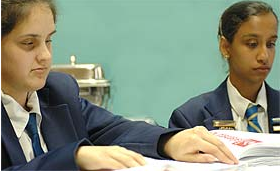 We are all equal before the law. Whether we are blind or can see, the law gives us equal protection.
We are all equal before the law. Whether we are blind or can see, the law gives us equal protection.
Our Constitution says that the state may not discriminate against anyone because of a disability. We should therefore treat blind people with the same respect as everybody else.
Blind SA
"Parents, if your baby is born blind, do not lose hope. If your child becomes blind later in life, do not despair," says Cathy Donaldson, President of Blind SA.
"Instead, help your blind child to get a good education and to do things for him or herself. With your help your child can learn to live a normal and productive life."
Blind SA, an organisation that helps blind people, says:
- Parents should not feel ashamed of a blind child.
- Parents should get to know blind adults to see how such people live normal and meaningful lives.
- Communities should support parents with blind children.
- Doctors, social workers and health workers should refer people to Blind SA for support.
Develop their senses
Blind children get to know the world through their senses like touching, smelling, tasting, and hearing. Parents or caretakers can help them to develop these senses.
Remember, they cannot see when you point at or talk about things. Let them feel and play with different objects that are rough, smooth, soft, hard, small or big.
Introduce them to new smells, tastes and sounds. Get toys that can make a noise. Put the toy in the child’s hand and encourage the child to play with it. If the child drops it, search for it by using hands.
Knowledge
Talk and read to blind children often. Make sure they understand and let them talk back. This helps them to learn the language while increasing their knowledge.
Teach them to do things for themselves like tying their shoes, dressing themselves, brushing their teeth and putting things back in their places. Take them for walks. Go to places like shops, museums, farms, parks and the zoo. Explain what each new place looks like.
Teach your blind child about dangerous things like fire, electricity and sharp objects.
Education
To help your blind child get a good education, you can:
- enrol your child at good schools, including pre-school, that can meet the child’s special needs;
- make sure the teachers have the skills to teach blind children;
- find out if Braille is taught;
- talk to the teachers and head of the school about your child’s blindness and about ways that you can work together;
- find out about study and training bursaries from Blind SA.
- Justice Mohale
For more information, contact: Cathy Donaldson at Blind SA:
(011) 753-1607/083 701 4246
E-mail: mwcathdo@mweb.co.za



 Facebook
Facebook Twitter
Twitter WhatsApp
WhatsApp